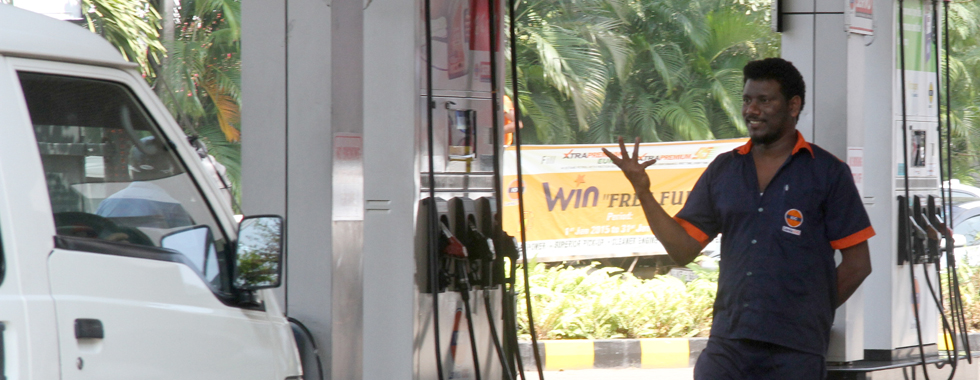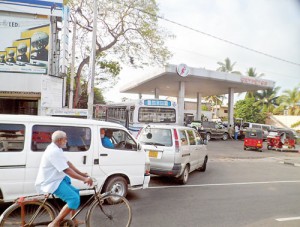News
Transport fares slow to follow fuel price cuts
Consumers are enjoying the drop in fuel prices but transport providers are being either slow or recalcitrant in passing on the benefits to the public.
Despite claims that private buses have already reduced charges commuters are yet to gain the benefits while state-run buses are awaiting instructions from the Transport Ministry on a price reduction.

No fuel, gestures this attendent at a petrol shed in Colombo 7 and (below) long queue at a shed in Matara. Pic by Indika Handuwala
Fuel prices were reduced from midnight on Wednesday.
The President of the Private Bus Owners’ Association, Gemunu Wijeratne, said his associate members would reduce bus fares by 7.2 per cent and the minimum charge by Rs. 1.
Mr Wijeratne said the price of diesel oil had been reduced by Rs. 16 and the previous government had also reduced diesel prices by Rs. 26 in three stages.
Sri Lanka Railways General Manager Vijaya Amaratunga said train fares would be cut if the transport minister and Cabinet made a decision to do so.
School van drivers said that they could not reduce fees simply because of a fuel price reduction.

Pic by Krishan Jeewaka Jayaruk
All-Island Inter District School Children’s Transport Association President N.M.K. Harischandra Padmasiri said school van fees had to remain at current levels because former ministers had increased public transport licences fees by 100 per cent and had also increased tyre and oil prices.
He said van drivers also had to deal with parking fees and vehicle repairs and maintenance at their own cost.
All-Island Three-Wheeler Drivers’ Union President Lalith Dharmasekera said three-wheeler drivers would not reduce fares.
He said he had strongly supported the system of metered trishaws that charge a standard rate of Rs. 50 per kilometre but said three-quarters of trishaw drivers did not possess meters. Of 20,000 trishaws only 1,500 used meters honestly. Some manipulated meters, he said.
One driver of an unmetered trishaw, Chandana Wipula Wickrama, said he now cuts Rs. 20 from each fare due to the cut in fuel prices. His fare was based on a rate of Rs. 40 per kilometre.
He claimed all trishaws would provide better service if all had to instal meters.
| Prices down, but no fuel! Even though some 72 hours has lapsed after the government reduced the prices of petrol and diesel,the message has apparently still not filtered down to hundreds of gas stations throughout the country, with some of them sticking to the old tariff while others said they had run out of stock. This resulted in long queues at petrol sheds. Many petrol shed operators said they were unwilling to release fuel to the consumers until the relevant authorities had taken note of the present stocks purchased from the Ceylon Petroleum Corporation at former prices They claimed that only when this was done would they be able to re-commence sales accordingly or else they would have to face severe losses. |

